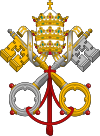- Divine Praises
-
The Divine Praises or Laudes Divinæ is a Roman Catholic prayer and, in some Dioceses, is traditionally recited following the liturgy of Benediction of the Blessed Sacrament. It is also said by pious Catholics after they have heard, seen or inadvertently uttered profanity or blasphemy.
Contents
History
The Divine Praises were originally written in Italian by Luigi Felici in 1797 for the purpose of making reparations after saying profanity or blasphemy.[1] The praises were expanded upon thereafter by Pius VII in 1801 and eventually came into existence as a recitation following the Benediction, usually with the priest saying each line which is thereafter repeated by the congregation. [2]
Text of the prayer
Latin English Benedictus Deus. Blessed be God. Benedictum Nomen Sanctum eius. Blessed be His Holy Name. Benedictus Iesus Christus, verus Deus et verus homo. Blessed be Jesus Christ, true God and true Man. Benedictum Nomen Iesu. Blessed be the Name of Jesus. Benedictum Cor eius sacratissimum. Blessed be His Most Sacred Heart. Benedictus Sanguis eius pretiosissimus. Blessed be His Most Precious Blood. Benedictus Iesus in sanctissimo altaris Sacramento. Blessed be Jesus in the Most Holy Sacrament of the Altar. Benedictus Sanctus Spiritus, Paraclitus. Blessed be the Holy Spirit, the Paraclete. Benedicta excelsa Mater Christi, Maria sanctissima. Blessed be the great Mother of God, Mary most Holy. Benedicta sancta eius et immaculata Conceptio. Blessed be her Holy and Immaculate Conception. Benedicta eius gloriosa Assumptio. Blessed be her Glorious Assumption. Benedictum nomen Mariae, Virginis et Matris. Blessed be the name of Mary, Virgin and Mother. Benedictus sanctus Ioseph, eius castissimus Sponsus. Blessed be St Joseph, her most chaste spouse. Benedictus Deus in Angelis suis, et in Sanctis suis. Amen. Blessed be God in His Angels and in His Saints. Amen. Notes
Prayers and the Catholic Church Note: Prayers in italics are normally indulgenced. Prayers of the Mass 
Marian prayers Other prayers Act of Contrition · Adoro te devote · Angele Dei · Anima Christi · Athanasian Creed · Ave Verum Corpus · Benedictus · De Profundis · Jesus Prayer · Laudes Divinae · Miserere mei · Morning offering · Nunc Dimittis · O Salutaris Hostia · Prayer before a Crucifix · Prayer of Saint Francis · Prayer to Saint Michael · Requiem Aeternam · Spiritual Communion · Tantum Ergo · Te Deum · Thanksgiving after Communion · Veni Creator Spiritus · Veni Sancte Spiritus · Visit to the Blessed Sacrament · Way of the Cross
Category · Portal Categories:- Roman Catholic prayers
Wikimedia Foundation. 2010.
